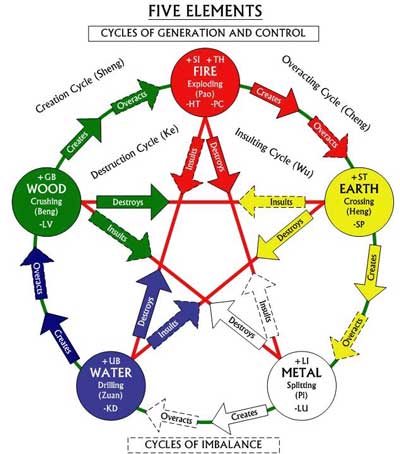
sponsor: Qi Journal
Navigation:
Portals
|
article: The Functions of Qi | author: Xing-Tai Li and Jia Zhao | date: 2016-02-22 14:17:16
|
|
The Functions of Qi An Approach to the Nature of Qi in TCM - Qi and Bioenergy (4)By Xing-Tai Li [1] and Jia Zhao [2] 4. The Functions of QiGenerally speaking, different kinds of Qi have different functions. Qi of the human body serves several vital functions within the body. When imbalances arise, they are seen as disruptions in the functions of Qi. A prolapse, for example, is seen as a disruption in the ability of Qi to provide the raising and stabilizing function on a particular organ. The main functions of Qi within the body are listed below: 
The Five Element theory (Wu Xing) is often used for describing interactions and determining sources and remedies of imbalances. Source: Wikipedia 4.1 Promoting functionQi is a sort of essence full of vitality. It can promote the growth and development of the human body, promote the physiological functions of each viscera, bowel, channel, collateral, tissue and organ and speed up the formation and circulation of blood and the metabolism of body fluid as well. For example, if the above functions are weakened as a result of the deficiency of Qi (vital energy), the following will occur: late and slow growth and development of the human body or senilism; weakened functions of viscera and bowels, channels and collaterals, tissues and other organs; insufficient blood formation or stagnation in blood vessels; and disturbance in the metabolism of body fluid. After birth, the Genuine Qi generated from Kidney Essence determines the growth and development of the human body. After middle age, Genuine Qi gradually declines, so a person grows old. If his Genuine Qi is deficient, a person's development will be poor.
The physiological functions of viscera and bowels and Channels and Collaterals of the human body all depend on the pushing of Qi as well as the nourishing of Blood. The vigor and the ascending, descending, exit and entry movements of Qi play a very important role in promoting the functional activities of viscera and bowels and Channels and Collaterals. Therefore, when Qi is deficient, hypofunctioning of viscera and bowels will ensue. For instance, deficient Lung Qi often leads to feeble breathing, a lower voice, lassitude, weak pulse, etc. Qi also promotes the generation, distribution and discharge of the Blood and Body Fluids. As Yin substances, Blood and Body Fluids depend on Qi's activities to be generated. In other words, generation of these substances relies on the activities of Qi of the Spleen and the Stomach, the Lung and the Kidney. Besides, Qi is a vigorous substance, so it can activate the flow of Blood and Body Fluids, as well as transform them into various secretions and excretions. For this reason, Qi Deficiency often leads to an impeded flow of Blood or stagnation of Blood, or retention of Body Fluids in the body, which, in turn, causes Phlegm or edema.
In TCM theory, blood and Qi are inseparable. Blood is the "mother" of Qi; it carries Qi and also provides nutrients for its movement. In turn, Qi is the "commander" of the blood. This means that Qi is the force that makes blood flow throughout the body. Losing too much blood causes an overall Qi deficiency. When there is a Qi deficiency, the body cannot function properly. 4.2 Warming functionQi, as a Yang substance, is rich in heat, which can warm viscera and bowels, Channels, skin, and muscles and tendons, to maintain normal body temperature and the normal functional activities of these organs and tissues. Qi helps to control homeostasis and provides warmth for the body. Yellow Emperor’s Inner Canon says: "Qi has a warming action". Qi is the main source of the heat needed by the human body. The body keeps its constant temperature mainly through the warming action of its Qi. Motion produces heat, so the heat carried by Qi is in fact, a result of the constant movement of Qi, and the body temperature is maintained by the constant movement of Qi. In addition, Qi’s warming function contributes to the movement of Blood and Body Fluids. The warming effect of Qi is an imperative condition for the free flow of Blood and Body Fluids within the body.
Pathologically, disorders of Qi in its warming function are mainly manifested as two kinds: one is a cold manifestation due to Deficiency of Qi, which results mostly from the deficient Qi failing to produce adequate Heat to warm the body, marked by aversion to cold and a desire for warmth, cold limbs, lower body temperature and sluggish flow of Blood and Body Fluids. A deficiency of Qi can cause lowered body temperature, intolerance to cold and cold limbs. The other is the manifestation of Heat due to stagnation of Qi, which is usually caused by sluggish flow of Qi in a local area. 4.3 Defending functionThe defensive ability of the body results from the combined action of a number of physiological functions, of which the function of Qi plays a particularly important role. The defensive effect of Qi mainly indicates that Qi can defend the body from external pathogens. The defending action of Qi is shown in two aspects. One is to guard the surface of the skin against the exopathogen. The other is to combat the invading exopathogen so as to ward it off. Defensive Qi functions to protect the body surface, and control the opening and closing of the pores, so it can prevent the invasion of external pathogens. If the defensive function of Qi is deficient, the resistance of the body against the invasion of these factors will be weakened, and as a result, susceptibility to such diseases as the common cold is likely to occur. When the defending function of Qi is normal, the exopathogen has difficulty in invading the body. When the defending function of Qi becomes weaker, when the ability of the human body to fight the exopathogen is lowered, the body is easily invaded and diseases are caused. And what is more, these diseases are hard to cure. 4.4 Consolidating and governing functionBy "consolidating and governing action", we mean that Qi holds organs in their place, keeps Blood in the vessels, governs the removal of fluids. Qi can keep blood flowing within the vessels; control and adjust the secretion and excretion of sweat, urine and saliva, and prevent the body fluid from escaping; consolidate and store sperm and prevent emission and premature ejaculation; hold the organs so as to prevent them from descending. A decrease in the above functions of Qi may cause various kinds of hemorrhage, spontaneous perspiration, polyuria, salivation, spermatorrhea, premature ejaculation, prolapse of the stomach, kidney and uterus. When Qi is deficient, Yin Fluids will be profusely lost. For example, failure of Qi to control Blood will cause various kinds of bleeding; inability of Qi to control Body Fluids will cause spontaneous sweating or profuse sweating, incontinence of urine or profuse urine; and failure of Qi to control emission will cause nocturnal emission, premature ejaculation, or seminal emission. The controlling effect of Qi and the pushing effect of Qi are opposite and supplement each other. On one hand, Qi promotes the distribution and discharge of Blood and Body Fluids; on the other hand, Qi controls the flow of these Yin substances to prevent their unnecessary loss. Only when these two opposite aspects are harmonized can the normal flow and discharge of the Yin substances and the metabolism of Blood and water be maintained. 4.5 Promoting metabolism and transformationThis refers to various conversions occurring along with the movement of Qi. It includes the changes of Qi during its movement and the generation and metabolism of Essence, Blood and Body Fluids and their transformation. "Qi hua" is a specific term in the science of TCM. It refers, in general, to various kinds of changes taking place in the body under the action of Qi. Specifically, it refers to the metabolism of fundamental substances, Qi, blood and body fluid, and the transformations which can occur between them. For example, Qi, blood and body fluid are formed in the following manner: ingested food is changed into food essence, and food essence is, in turn, transformed into Qi, blood or body fluid, and these can then be changed into any one of the others according to the physiological need of the body. All these are the specific manifestations of the action of the activity of Qi. The dysfunction of Qi in performing its action will affect the whole metabolism of the body. That is to say, it will affect the digestion, absorption, transformation and transportation of food: the formation, movement and transformation of Qi, blood and body fluid; and the excretion of feces, urine and sweat; thus causing various symptoms associated with abnormal metabolism. In short, the process in which Qi performs its functions is the process in which the substances in the body are metabolized, and in which the substances and energy are transformed. Qi assists in the formation and transformations within the body, for example the transformation of food into Qi and Blood. Qi is the foundation of all movement and growth in the body. Although the above mentioned five functions of Qi differ from each other, they are all based on the basic property of Qi and enjoy close cooperation and mutual support. [Click here to continue to section 5, "The Movement of Qi"]. Navigation links to sections in this article:
1-2: The History and Concept of Qi. Endnotes:This and the other entries herein appeared in: Xing-Tai Li and Jia Zhao (2012). An Approach to the Nature of Qi in TCM–Qi and Bioenergy, Recent Advances in Theories and Practice of Chinese Medicine, Prof. Haixue Kuang (Ed.), ISBN: 978-953-307-903-5, InTech, DOI: 10.5772/28416. Available from: http://www.intechopen.com [1] ^ College of Life Science, Dalian Nationalities University, Dalian, China, is given as the professional location of Xing-Tai Lii. [2] ^ Norman Bethune College of Medicine, Jilin University, Changchun China, is given as the professional location of Jia Zhao. Graphics added by Qi Encyclopedia. |
